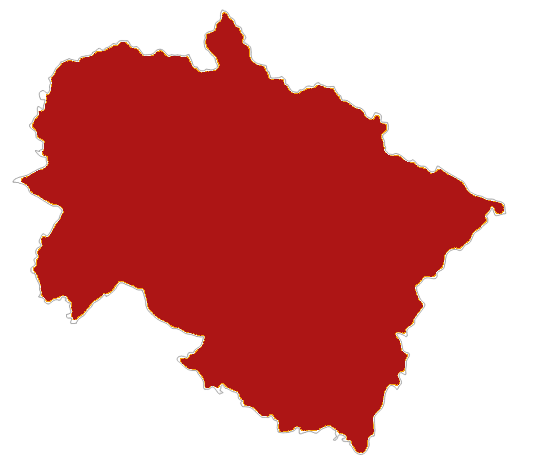
Uttarakhand is the 27th State carved out of Uttar Pradesh in 2000. It is located at the foothills of Himalayan Mountain ranges and is largely a hilly state sharing international borders with China (Tibet) and Nepal. Within the country the State shares borders with Himachal in the north-west and Uttar Pradesh in the south. The state can be divided into three physiographical zones, namely, the Himalayan, the Shivalik and the Tarai region. The average rainfall in the state is around 1550 mm, with most regions falling in temperate climatic zone. The state is divided into two administrative regions, Kumaon and Garhwal wherein Chamoli district lies in the later.
The state has a total geographical area of 5.35 million ha, of which 4.6 million ha (86%) is mountainous and 0.74 million ha (14%) is plain. The state’s terrain is mostly to blame for the fact that only 14% of the total area is arable. The State offers some special advantages for the development of horticulture, agro-processing enterprises, organic farming, off-season vegetable production, and cultivation of medicinal and aromatic plants that can be profitably utilized due to its location and diverse climate. Forests cover approximately 61.1% of the state’s land area. In comparison to the national average of 43.37%, the share of net sown area is only about 14%. The proportion of culturable wasteland is approximately 7%, implying a significant potential for
fodder trees and other plantation crops such as fruits.
Agriculture is a major industry in the state economy, accounting for around 23.4% of the state’s GDP (GDP). The state’s average land holding size is 0.95 hectares compared to the national average of 1.57 ha. The share of small and marginal holdings in Uttarakhand State is greater than the national average. The state’s agriculture economy is still strongly reliant on rainfall. The state’s net irrigated area is 3.45 lakh acres, 85.83% of the land is in plains, while 14.17% is on hills. The irrigation intensity in the state is 159%, ranging from 155% in the plains to 184% in the hilly region. Uttarakhand has a diverse range of soils and agro-climatic conditions, ranging from subtropical to Alpine, making it a major biodiversity hotspot for a diverse range of wild and cultivated medicinal aromatic species. The state contains about 200 unique plants with therapeutic characteristics. The total geographical area of the state comprises of 3.66 lac hectares of cultivable waste land that can be utilized to grow aromatic crops. Himalayan Mountain Ecosystem is home to approx. 1,748 medicinal plant species and one of the 36 global biodiversity hotspots.
Chamoli District
Chamoli district is one of the most scenic and diverse districts of Uttarakhand, situated in the Garhwal region of the state. The district covers an area of 7520 square kilometers and is home to over 391,000 people, mostly residing in rural areas. The geography of Chamoli district is characterized by high mountain peaks, glacial rivers, and lush green forests. Due to its diverse geography and limited land availability, the socio-economic conditions of the people in the region are challenging. The primary livelihood options for the people are agriculture, animal husbandry, and collection and selling of non-timber forest produce (NTFP), including medicinal and aromatic plants (MAPs). Chamoli district is known for its rich biodiversity and is home to several species of MAPs, including Picrorhiza kurroa, Nardostachys jatamansi, Rheum emodi and Valeriana jatamansi etc. However, the sustainable cultivation and management of MAPs are still in their infancy in the region. According to a report by the Forest Survey of India, Chamoli district has a potential area of 30,903 hectares for the cultivation of MAPs, but only 4,016 hectare is currently under cultivation, indicating a significant scope for improvement in this sector. The potential for MAPs cultivation in the region is immense and can significantly contribute to the economic development of the district and the state.
The work in the Indian state of Uttarakhand is commenced in the year 2011. The purpose of Udyogini’s intervention was the development of the MAPs value chain. Intervening in Two districts of the state Chamoli and Almora: Nandanagar Ghar, Dewal, Tharali, Dasholi, Joshimath, Kranpryag, Block and Alora District’s Daniya Block Major products working on Medicinal and Aromatic Crops, Miletus and Pulses, Spices, Oyster Mushroom, Wild honey, Dairy farming and Handlooms products. We are working in four areas in Uttarakhand
Value Chain Intervention: Udyogini Promoted to Aromatic & medicinal plant value chain intervention refers to a systematic approach aimed at improving the production, processing, and marketing of MAPs. It involves various activities and strategies to enhance the value chain of Herbs, from cultivation to the final product reaching consumers.
Cultivation and Harvesting: - Providing training and extension services to farmers on best cultivation practices, including seed selection, planting, and harvesting techniques. Promoting organic and sustainable farming practices to ensure the production of high-Demandable Aromatic & Medicinal plants. Facilitating access to quality planting materials and seeds through nurseries or seed.
Encouraging the cultivation of endangered or threatened MAPs plant species through cultivation programs.
Processing and Extraction -
Developing local processing facilities for MAPs plants to reduce post-harvest losses and enhance value addition.
Training local communities on appropriate processing techniques such as drying, grinding, and extraction of active compounds.
Introducing modern processing technologies to improve the efficiency and quality of extraction processes.
Promoting the development of standardized protocols for extraction and processing to ensure consistency and quality of the final products.
We are getting product develop the Aromatic Crop, Tulsi Green Tea, Rosemary Green Tea, Lemongrass Green Tea, Chamomile Tea,
Quality Control and Certification -
Establishing quality control mechanisms and standards for MAPs plant products.
Ensuring compliance with labeling requirements, including proper product information, dosage instructions, and safety warnings.
Marketing and Market Access -
Conducting market research to identify potential domestic markets for Our Green Tea and Medicinal roots products. Supporting the formation of cooperatives or producer groups to collectively market their products.
Assisting producers in complying with export regulations and standards to access Local markets and cooperative’s Outlet.
- Livelihood Development: Udyogini has been working on increase in livelihood Agriculturally base, Promoting the adoption of modern agriculture practices, techniques, information, and demonstrations on improved MAPs Farming method, Conservation MAPs farming MAPS Crops Diversification promoting the Cultivation of diverse crop can improve farmers’ resilience to market fluctuation and introducing high-value MAPs crop and medicinal plant crops can provided farmers with alternative income.
- Climate Change:
Climate change can have significant impacts on medicinal and aromatic plants (MAPs) in the Chamoli district, as it can disrupt their growth, quality, and availability. Here are some potential effects of climate change on MAPs in Chamoli and possible interventions to address these challenges:
Climatic Conditions -
Rising temperatures and altered rainfall patterns can affect the growth and distribution of MAPs. Some species may struggle to adapt to new conditions.
Intervention: Conducting research to identify climate-resilient MAP species that can thrive under changing climatic conditions. Promote cultivation and conservation of these species through awareness campaigns and technical support to farmers.
Climate change can disrupt the timing of flowering, fruiting, and other life cycle events of MAPs. This can affect their reproductive success and availability of plant material for medicinal purposes.
Intervention -
Monitoring and documenting changes in phenological patterns of MAPs. Developing strategies to manage and conserve species with disrupted phenology, such as adjusting cultivation practices, implementing assisted reproductive techniques, and promoting seed.
Intervention: Studying the physiological responses of MAPs to changing climate conditions. Identifying appropriate cultivation practices, such as shading or irrigation techniques, to mitigate the negative effects and maintain the quality of medicinal compounds.
Loss of Traditional Knowledge and Practices -
Climate change impacts, coupled with socio-economic changes, may lead to the loss of traditional knowledge and practices related to MAP cultivation, harvesting, and processing.
Intervention: Documenting and preserving traditional knowledge through community-based initiatives. Promoting the exchange of knowledge among generations and establishing platforms for knowledge sharing. Supporting sustainable livelihoods based on MAP cultivation and processing, which can help retain traditional practices.
Cultivation and Sustainable Sourcing -
Establish or collaborate with farmers and communities for the cultivation of MAPs using sustainable and organic practices.
Promote fair trade and ethical sourcing by ensuring fair prices and working conditions for farmers and supporting biodiversity conservation in the collection of wild-harvested MAPs
- Entrepreneurship:
Udyogini supported MAPs (Medicinal and Aromatic Plants) cultivation, processing, value addition, and marketing of medicinal and aromatic plants. It involves harnessing the economic potential of these plants while promoting sustainable practices and contributing to the well-being of communities and the environment.
Identifying Market Opportunities -
Conduct market research to identify high-demand MAPs, both domestically market trends, and regulatory requirements.
Explore niche markets and value-added products, such as herbal teas, oils, on the specific medicinal and aromatic properties of different plant species.
Processing and Value Addition -
Set up processing facilities to transform raw MAPs materials into value-added products. This may involve drying, distillation, extraction, or formulation processes.
Quality Control and Certification -
Implement quality control measures at every stage of production to maintain the highest standards for MAP products.
Branding and Marketing -
Develop a unique brand identity that emphasizes the natural, medicinal, and aromatic qualities of the MAPs products.
Employ effective marketing strategies to reach target consumers, including in trade fairs or exhibitions.
Highlight the sustainability and local communities and conservation efforts.
Entrepreneurial Skills and Capacity Building -
Enhance entrepreneurial skills, such as business planning, financial management, marketing, and supply chain management.
Udyogini Provide training and capacity-building programs for farmers, stakeholders, BDSP and Udyogini staff involved in the MAPs value chain to ensure quality and consistency in production.
Collaboration -
Collaborations with relevant stakeholders, including farmers, suppliers, retailers, to strengthen the value chain and demotic Market.
- We reached 2500 + farmers Skills and Capacity Building for MAPs crops Conservation.


